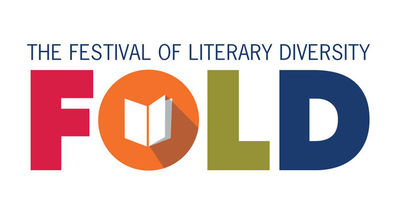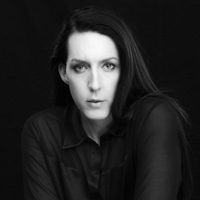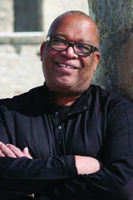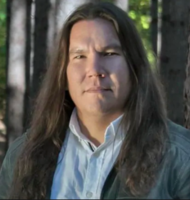"Inclusion Means More Than Just Checking a Box" FOLD Authors Ferguson, Foster & Rice on CanLit, How They Write & What They're Reading
It's hard to think of a literary event that has grown and expanded as quickly and with as much excitement around it as the The Festival of Literary Diversity (aka the FOLD). In just a few short years, it has become one of the most prestigious, vibrant, and beloved festivals in the country, bringing guests, authors, and educators to Brampton from across Canada.
Canadian readers have proven their desire for diverse, beautifully written, and powerfully told stories at the FOLD and today we're lucky enough to speak to three of the talented guest authors appearing at the festival: Joshua M. Ferguson, author of Me, Myself, They: Life Beyond the Binary (House of Anansi Press); Cecil Foster, author of They Call Me George: The Untold Story of Black Train Porters and the Birth of Modern Canada (Biblioasis); and Waubgeshig Rice, author of Moon of the Crusted Snow (ECW Press).
This year the FOLD runs from May 2 to May 5 and tickets are still available. And if you want to see Joshua, Cecil, and Waubgeshig in person, check out their events: Joshua at "My Body is an Activist: Nonfiction Writing that Reacts and Resists"; Cecil at "I Remember: Telling Family Stories" and "Black Writers Matters"; and Waubgeshig at "Imagi-Nation" and "All Our Relations: An Indigenous Showcase".
Talking with the guest authors today, we hear about the problematic "checking a box" approach to diversity in CanLit; how the writing process expands far beyond the keyboard and can be found while driving or walking to work; and the powerful diverse voices the authors are reading and loving at the moment.
You can also check out our interview with FOLD's first ever writer-in-residence, S.K. Ali, to learn even more about the festival.
Open Book:
Tell us about how you become involved with the FOLD and what you'll be doing in the festival.
Joshua M. Ferguson:
Me, Myself, They is my first book and this will be my first time at FOLD! It’s exciting timing because my book is coming out a few days (on May 7, 2019) after my participation in the festival. I’m joining Imani Barbarin, Adam Pottle, and Carrianne Leung on the panel “My Body is an Activist” – “how books and bodies intersect in various ways.” I appreciate our panel’s focus because who I am at my core, including my body, expanded in unexpected ways while I was writing my book. And, in my book, I note the almost alchemical connection an author makes with their body while writing, which for me, took the form of summoning memories and feelings through the recesses of trauma that I had repressed to survive. Writing my book was an awakening through, and of, my body into the screen with each word.
Cecil Foster:
I like to think that in some way, I was involved with FOLD even before it started. I remember serving on Jael Richardson’s committee when she was a Master’s Student at the University of Guelph and she was working on what would become her well-known book about her father’s experience in Canada. Even back then—and particularly at her thesis defence, when afterwards she and I talked about the challenges of getting published and how to turn a thesis into a book, we were concerned about the lack of recognition for diversity in Canada generally and in CanLit specifically. I am glad Jael did something about it. So, I watched from the sidelines silently cheering on Jael, my student, and celebrating also silently as the festival thrived. Now I am honoured that she and the FOLD have invited me to participate.
Waubgeshig Rice:
I was first invited to the FOLD in 2016 and it was one of the most affirming and encouraging experiences of my life. It felt like a long overdue celebration of crucial voices, and it was a huge honour just to be there. I had my fingers crossed for an invitation back to the FOLD once my latest novel came out. I was thrilled to get an email asking me to join the 2019 edition. It’s been wonderful to see the festival expand and generate a louder buzz in the literary realm. It really feels like there’s a revolution underway. This year, I’ll be part of two FOLD events: the "Imagi-nation" panel discussion on Saturday morning, and then I’ll be hosting "All Our Relations: An Indigenous Showcase" on Saturday evening. I’m really excited to be a part of these conversations!
OB:
Can you share a little about your experience of diversity (or barriers to diversity) in Canadian literature, both as a writer and reader?
JMF:
Trans people’s stories are varied and diverse. We aren’t a monolith. Finding myself meant moving beyond the binary in terms of how I accept myself and who I could still become. In many fields, the inclusion of trans, non-binary, or gender non-conforming people isn’t happening altogether, or an inclusion that means more than just checking a box for the sake of diversity. I’ve certainly found it difficult at times to find a place that welcomes me for me and my talents as an author, filmmaker, and actor. It can be upsetting to realize that being welcomed or included is a practice run, or test, or a check off their diversity list. Including trans people is still so new that I often feel like a token or an object being positioned strategically. I want to feel like my talent has worth and that it is appreciated.
And, then I’ve come across many institutions, organizations, and movements that fail to understand that the reality of gender is diverse, and that we need to find ways to envision a society where human beings aren’t always placed into either/or categories. In literature, film and television, incredibly complex worlds are created that still view humanity as tied to the binary. It’s reductive, especially when I read or watch science-fiction, fantasy, and even drama that is tied to an essentialist framework of gender: to be man means you have to be masculine and to be a woman means you have to be feminine, and there is nothing else, no movement into gender non-conformity or thinking about gender beyond the binary. It’s almost comedic that in many creative realms, written with such imagination, that we’re still so uncreative, and boring, when it comes to gender.
Your CanLit News
Subscribe to Open Book’s newsletter to get local book events, literary content, writing tips, and more in your inbox
CF:
When I was first published as a Canadian author, it was still a rarity for someone like me. Before then the first Black writer to really gain mainstream notice in Canada was Austin Clarke, so naturally he and I became quite close. We would always be talking about how tough it was to be a Black writer, how lonely and often misunderstood by editors and reviewers it was for us as Black writers, and about what we could do to encourage others. There were a few other non-white writers around back then, but effectively Canadian Literature was white. I remember Robertson Davies, then the lion of Canadian literature, talking about how it would take generations and generations—I think he said three, for the offspring of non-white immigrants to become Canadian and that the literature of the country would reflect this. This was a view widely held and when publishers were talking about finding the “great Canadian novel”—they unabashedly meant a white novel.
So, my first novels—which we would launch at community events, at Caribbean consulates, particularly the Barbadian—were celebrated as helping to break down the barriers for non-white Canadians generally. But I like to think that I acted as an activist too, especially in my nonfiction works and as a journalist, broadcaster, and academic. One of the things that I am most proud of is the number of budding Black writers that I introduced to editors and agents and who are now well-established writers in their own right. Among the memories I hold dear is the publication of an anthology of Black writers in Canada called Fiery Sprits by HarperCollins Canada. That book introduced Canada to many of today’s top Black writers, and I still smile when I recall how over drinks at a hotel bar in Toronto I mapped out with the late Ayana Black the basics for that anthology on the back of a napkin, and then introduced Ayana to Ed Carson who was then the publisher at HarperCollins, and who had been my first publisher at Random House Canada. As they say the rest is history.
WR:
As a young reader I faced a major barrier in that diversity in the high school English curriculum was non-existent. I wasn’t exposed to any diverse voices as a high school student in rural Ontario in the 1990s. Thankfully I had an aunt who identified my blossoming passion for literary storytelling, and she made an effort to share books with me by Indigenous authors. My parents were also very well-read, and ensured I was exposed to authors we weren’t reading in school. As a writer, I’ve seen a big change in recent years when it comes to diversity in CanLit. Early on I felt very tokenized as an Indigenous author published primarily by an Indigenous press. Sometimes it felt like I was a part of an event just so that the organizer to check a box. But nowadays I’m asked to sit on panels and be part of events not just because I’m “diverse”. I get to discuss plot, setting, and other literary themes, instead of just the role of diversity. So thankfully, literary events have evolved.
OB:
What does an average writing day look like for you? What, if any, are the tools or rituals you find yourself most in need of when settling down to work on a writing project?
JMF:
Writing is a very intimate practice for me. Perhaps this is because Me, Myself, They is so personal and I had to write through my trauma, at times this meant writing through my tears and pain. Although I approach writing intimately, I still need to write in public most of the time as I find that being around transient energies, whether it’s in a café or library, distracts the sort of consciousness that can prevent creativity. I’ve always been intrigued, in a romantic sense, when writers use pen and paper to write. But, I can’t seem to do this. I write from a laptop with green tea always within reach!
CF:
Really, an average writing day for me is the full day—24 hours. Every thinking moment. I say this because writing begins even before you sit down and start tapping out words on a machine or start scribbling on paper. Writing for me is playing with ideas. So my wife likes to say she knows when I am writing, even when I am driving. It is when I stop at a green light, thinking it is red, or we hear the horns behind our car when I am not quick enough moving off when the lights change to green. I say that to emphasis how important the thinking is and how all-consuming it can be.
As to rituals, I don’t think I have any per se. Well unless, the thinking part is the ritual. As I never try to confront a blank screen or page hoping inspiration would strike me in the moment. I always start with a very good idea of what I want to say. Then it becomes a play with, and of, words.
WR:
Because I have a full time job in journalism, my fiction writing is limited to evenings and weekends. I used to write in the mornings before work, but since I became a dad, that’s a lot more difficult to do when everyone needs to get ready in the morning for day care and work. So nowadays my typical routine looks like answering emails related to literary projects when I have time before work in the morning, then my “writing” gets underway on my walk to work. I’ll go over ideas in my head and sometimes make notes on my phone while walking. Once work’s done in the evening and everyone’s eaten and winding down, I’ll flush out some of those ideas and try to commit them to text. And then on the weekends, I try to set as many hours aside as possible. My wife is very supportive and encourages me to go out to a cafe or pub to get a good chunk of writing done. I enjoy the ambient noise of those kinds of settings to get the wheels turning!
OB:
Tell us about a book you've loved and would like to highlight that you feel is an example of the diverse literature the FOLD is celebrating.
JMF:
There are so many books that I could note as an example. I’m particularly grateful for all of the Indigenous writers and voices publishing powerful Canadian literature right now: Tanya Talaga, Alicia Elliott, Billy-Ray Belcourt, Gwen Benaway, Joshua Whitehead, Arielle Twist, Jules Koostachin, Lindsay Nixon, Harold Johnson, Waubgeshig Rice.
CF:
I’ll pass on this question, as truthfully I think all writing is good writing, and that at times somewhat snobbishly we become too concerned about the forms. Writing is still ultimately communicating—and all forms of communication are worthy and purposeful. For me it is the story, and the ability to tell the story, that matters most. I believe all stories find their form or genre, so there is no real repeatable example that is universally acceptable. Everything has to be judged in a context. And besides, different cultures have different aesthetic standards, different examples of what is worthy of celebration, which is a wonderful thing in a diverse multicultural country, as we should constantly be forced to share and move out of our comfort zones and to taste different things, to even surprise ourselves that what we perceptively thought would have been bad and tasteless might not be. The issue, then, should not be the forms—or example of them, per se—but who and how many people, and hopefully from all backgrounds and tastes, get the right to communicate/write and to be published.
WR:
It’s hard to pick just one! But I absolutely loved There There by Tommy Orange. It’s a powerful novel that intimately examines the lives of the Native community in Oakland, California. The characters’ lives intersect in a way that’s only really possible in an urban Indigenous community. It reminded me of my experiences living in cities like Winnipeg, Ottawa, and Toronto. There are some universal stories among Indigenous peoples in different cities on this continent, but there are beautiful elements that also make them unique. There There is a wonderful exploration of these complicated, chaotic, and caring lives.
_________________________________________
For more information about the FOLD and the full 2019 schedule, visit their website.
Joshua M. Ferguson (Ph.D.) is a non-binary trans (they/them) writer, filmmaker, advocate, and alchemist. In 2018, they became the first person to receive a non-binary birth certificate with an “X” designation in their home province of Ontario, and their advocacy on behalf of non-binary trans people has contributed to government reform in Canada. With their production company Turbid Lake Pictures, Ferguson’s filmmaking work includes the award-winning Whispers of Life; Limina, which was shown at festivals around the world and praised for its trans inclusivity, and the love story Henry’s Heart. Their writing and advocacy efforts have been featured in international publications including the Toronto Star, the Guardian, NBC News, HuffPost, VICE, BuzzFeed, Teen Vogue, and OUT Magazine. Ferguson lives in Vancouver, British Columbia, with their partner Florian. Me, Myself, They is their first book.
Cecil Foster is a leading author, academic, journalist and public intellectual. His work speaks about the challenges that Black people have encountered historically in Canada in their efforts to achieve respect and recognition for their contribution to what is now a multicultural Canada. He highlights their fight for social justice and human dignity. In particular, Foster addresses the issues of immigration in his critical discussions on who is a Canadian in the ever-evolving social narrative toward a genuine multicultural Canada.
Waubgeshig Rice is an author and journalist originally from Wasauksing First Nation. His first short story collection, Midnight Sweatlodge, was inspired by his experiences growing up in an Anishinaabe community, and won an Independent Publishers Book Award in 2012. His debut novel, Legacy, followed in 2014. He currently works as a multi-platform journalist for CBC in Sudbury. In 2014, he received the Anishinabek Nation’s Debwewin Citation for excellence in First Nation Storytelling. Waubgeshig now splits his time between Sudbury and Wasauksing.






